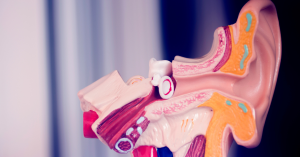Have you ever noticed that familiar sounds suddenly seem muffled, tinny, or just “off”? Maybe voices on the phone sound robotic, or everyday noises seem strangely quiet or distorted. If you’ve had this experience, you’re not alone—and you’re right to be curious, or even concerned.
Distorted hearing can take many forms. Some people describe it as if they’re listening through a fog or underwater. Others say it feels like sounds are echoing, overly sharp, or strangely hollow. Sometimes it happens in one ear, other times in both. And while it’s not always painful, it can be unsettling, isolating, and frustrating—especially when it interferes with conversation or the enjoyment of things like music or TV.
The causes of this kind of hearing distortion range from simple and easily treatable to more complex or chronic issues. In many cases, distorted hearing is temporary and reversible—a result of earwax buildup, fluid in the middle ear, or pressure changes. But sometimes, it’s a symptom of something deeper, like age-related hearing loss, nerve damage, or an inner ear disorder.
In this article, we’ll walk you through:
- What distorted hearing feels like
- Common causes of muffled or strange sound perception
- When it’s likely to go away—and when it might not
- What you can do to treat or manage it
- When to seek professional help
Understanding the root of your symptoms is the first step toward clarity—both in sound and in peace of mind.
What Distorted Hearing Feels Like
Distorted hearing doesn’t always mean total hearing loss. In fact, many people with normal hearing tests still report that things “don’t sound right.” These changes can be subtle or pronounced, affecting how you hear speech, music, or environmental sounds. Understanding what this distortion feels like can help identify the possible cause and direct the right course of action.
1. Muffled Sounds
This is one of the most common complaints. People describe it as though they’re listening with cotton in their ears or underwater. Voices lose their sharpness and clarity, and background noise may seem oddly muted or dull.
2. Robotic or Tinny Voices
Some people say voices on the phone or TV sound artificial or mechanical—like a robot or a bad recording. This “digital” or “metallic” sound is often a result of problems in how your ears or brain process certain frequencies.
3. Echoes or Sound Delays
Others experience echoes, like a sound is repeating slightly after it’s spoken, or a sense that sounds are arriving out of sync. This can happen with issues in how both ears are processing sound or due to irregularities in your hearing system’s timing.
4. Pitch Changes
In some cases, the pitch of sound changes. High-pitched sounds may vanish completely, while others may seem exaggerated. This can affect music enjoyment and the ability to understand speech, especially when consonants (like “s,” “sh,” or “f”) become difficult to detect.
5. One-Sided or Uneven Hearing
Distorted hearing may happen in just one ear or feel more noticeable on one side. This could be due to physical blockage, nerve issues, or differences in how each ear processes sound.
6. Fluctuating Sound Quality
For some, the distortion comes and goes. It may be tied to sinus pressure, allergies, fatigue, or even posture. If your hearing changes noticeably throughout the day, that fluctuation is important to note.
Common Causes of Distorted or Muffled Hearing
Hearing distortion can happen suddenly or build up over time. The underlying causes range from simple, everyday problems to more complex medical conditions. Knowing what’s behind your symptoms is the key to figuring out whether they’re temporary or need professional care.
1. Earwax Blockage
A common and easily treatable cause. When earwax builds up too much, it can block the ear canal, dulling or distorting the sounds that reach your eardrum. Some people also experience a feeling of fullness or pressure in the ear. Fortunately, this is usually reversible with safe removal.
2. Middle Ear Infections or Fluid
Conditions like otitis media (middle ear infection) or eustachian tube dysfunction can cause fluid buildup behind the eardrum. This changes how sound travels through the middle ear and results in muffled or distorted hearing. It’s especially common during colds, allergies, or sinus infections.
3. Sudden Pressure Changes
Air travel, diving, or altitude shifts can affect ear pressure. If your ears don’t “pop” properly, it can create temporary hearing distortion. This usually resolves once pressure equalizes but may linger if there’s an underlying sinus or eustachian tube issue.
4. Noise-Induced Hearing Damage
Exposure to loud environments—concerts, power tools, or even headphones—can damage the delicate hair cells in the inner ear. This can lead not only to hearing loss but to distortion, where sounds seem fuzzy, sharp, or off-pitch, even if you still “hear” them.
5. Age-Related Hearing Loss (Presbycusis)
As we age, our hearing changes—particularly in the high frequencies. This doesn’t just reduce the volume of sounds but can make speech unclear and change how sounds are perceived. Often, people describe voices as less crisp or harder to distinguish in background noise.
6. Inner Ear Disorders
Conditions like Meniere’s disease, labyrinthitis, or vestibular neuritis can cause temporary or chronic hearing distortion, often along with dizziness or a feeling of fullness in the ear. These may require evaluation by an ENT (ear, nose, and throat doctor).
7. Neurological Conditions
In rare cases, distorted hearing may stem from how the brain processes sound rather than a problem with the ears themselves. Conditions affecting the auditory nerve or brain regions involved in hearing can lead to sound quality changes.
When Distorted Hearing Can Be Fixed
The good news? Many causes of distorted or muffled hearing are temporary and treatable. Whether it’s due to a physical blockage, pressure imbalance, or minor inflammation, the distortion can often go away completely with the right approach.
1. Earwax Removal
If wax is the issue, removing it (safely) can provide immediate relief. Avoid using cotton swabs, which can push wax deeper. Instead:
- Use over-the-counter drops or oils to soften the wax
- Have it removed professionally by a healthcare provider
Once the blockage is cleared, sounds often return to normal instantly.
2. Treating Middle Ear Infections or Fluid
If your ears feel full or your hearing is muffled after a cold or allergy flare-up, there may be fluid behind the eardrum. This often resolves with:
- Decongestants or nasal sprays
- Antihistamines (if allergies are involved)
- Antibiotics (if there’s an infection)
Children and adults with frequent infections may also benefit from seeing an ENT specialist.
3. Resolving Pressure Imbalances
Distorted hearing from air travel or altitude changes usually resolves as your ears equalize. You can help the process by:
- Yawning, chewing gum, or swallowing
- Using the Valsalva maneuver (gently blowing with your nose pinched)
- Trying a decongestant if congestion is present
If your ear stays blocked for more than a few days, you may have eustachian tube dysfunction and should be evaluated.
4. Rest After Noise Exposure
If you were recently at a loud concert or exposed to sudden loud noise, your ears might need a break. Temporary threshold shifts can distort hearing for hours or days. Protecting your ears and allowing time to recover is key. If distortion persists beyond 48 hours, seek medical advice.
5. Medication Adjustments
Some medications (called ototoxic drugs) can temporarily affect hearing. If you’ve recently started a new medication and notice changes in hearing quality, speak to your doctor. Do not stop medication on your own, but do bring up hearing concerns promptly.
When It Might Be Permanent (And What to Do About It)
Not all cases of distorted hearing can be completely fixed. When distortion is caused by damage to the inner ear or auditory nerve, the effects are often long-lasting or permanent. That said, there are effective ways to manage and improve how you hear and function day to day.
1. Sensorineural Hearing Loss
This is the most common type of permanent hearing loss, caused by damage to the hair cells in the cochlea or the auditory nerve. It doesn’t just reduce volume—it affects clarity, making voices sound distorted, especially in noisy environments.
People often say:
- “I can hear, but I can’t understand.”
- “Speech sounds garbled, especially on the phone or TV.”
Unfortunately, hair cells in the inner ear do not regenerate, so sensorineural loss typically doesn’t reverse. However, hearing aids and other tools can make a significant difference.
2. Hidden Hearing Loss
In some cases, standard hearing tests show “normal” results, yet the person still experiences distortion, especially in complex sound environments like restaurants or crowds. This may be due to damage in the synapses that transmit sound signals—what’s sometimes called hidden hearing loss.
While it’s harder to diagnose, strategies like signal processing hearing aids, auditory training, and environmental adjustments can help.
3. Auditory Neuropathy or Brain-Based Hearing Issues
Sometimes, distortion comes not from the ear itself, but from how the brain processes sound. This could be due to:
- Auditory neuropathy spectrum disorder (ANSD)
- Stroke or traumatic brain injury
- Age-related cognitive decline
In these cases, hearing aids may help, but auditory rehabilitation, clear communication strategies, and supportive technologies (like captions or personal amplifiers) are just as important.
4. How Hearing Aids and Assistive Tech Can Help
Today’s hearing aids are highly advanced. They don’t just amplify sound—they enhance speech clarity, reduce background noise, and even stream audio directly from your TV or phone. Some include:
- Speech-in-noise processing
- Directional microphones
- Custom frequency response adjustments
Additionally, personal sound amplification products (PSAPs) and TV listening devices can be tailored to improve clarity for people who aren’t yet ready for full hearing aids.
5. Coping Strategies and Communication Tips
If distorted hearing is permanent:
- Ask others to speak clearly, not louder
- Reduce background noise whenever possible
- Use captions or subtitles
- Face the speaker when having conversations
- Don’t hesitate to tell others you have trouble with clarity—it helps them adapt their speech
When to See a Hearing Specialist
Distorted or muffled hearing might seem like a minor nuisance at first, but it can signal underlying issues that deserve professional attention—especially if the problem persists, worsens, or affects your quality of life. Knowing when to seek help is essential to prevent further damage and get the support you need.
1. Signs You Shouldn’t Ignore
You should schedule a hearing evaluation if:
- Sounds have been muffled or distorted for more than a few days
- You experience distorted hearing alongside dizziness, ear pain, or ringing (tinnitus)
- You hear robotic or garbled voices, especially in both ears
- You’re frequently asking others to repeat themselves or struggling to understand speech
- You’ve been exposed to loud noise recently and haven’t returned to normal hearing
These symptoms could be linked to treatable conditions—or signs of progressive hearing loss that require intervention.
2. What a Hearing Test Includes
An audiologist or hearing specialist will conduct a series of tests to determine:
- Your hearing thresholds (how loud sounds need to be for you to hear them)
- Your ability to understand speech in quiet and noisy settings
- Whether the problem lies in the outer, middle, or inner ear—or in how your brain interprets sound
They may also examine your ear canals for blockages or signs of infection.
3. Why Early Action Matters
The sooner you identify the cause, the better your chances of restoring or managing your hearing effectively. Left untreated, hearing problems can lead to:
- Increased isolation and social withdrawal
- Fatigue from constantly trying to decipher sound
- Heightened risk of cognitive decline
- Reduced quality of life
Many people wait years before seeking help—don’t be one of them. Modern hearing solutions are more discreet, comfortable, and effective than ever before.
4. Hearing Support Options
If your distorted hearing turns out to be permanent or related to aging:
- Hearing aids can enhance clarity, especially in noisy settings
- Assistive devices (like amplified phones or TV listeners) can bridge gaps
- Communication strategies and counseling can help you adapt and thrive
The right hearing professional will guide you toward a solution that fits your lifestyle, budget, and degree of hearing difficulty.
FAQ
Can distorted hearing go away on its own?
Yes, in many cases. Distorted hearing caused by earwax, fluid in the middle ear, pressure imbalances, or temporary noise exposure can often resolve on its own or with simple treatment. However, if it persists beyond a few days, a professional evaluation is recommended.
Why do voices sound robotic or echoey to me?
This can be due to issues in how your ear or brain is processing sound, often related to sensorineural hearing loss or auditory processing problems. Sometimes it’s caused by hearing aid settings or electronic transmission, such as poor-quality phone calls or digital compression.
Is distorted hearing always a sign of hearing loss?
Not always. It can be caused by temporary conditions like blockages or infections. But it can also be an early indicator of hearing loss or damage to the inner ear, especially if it’s accompanied by difficulty understanding speech in noise.
What should I do if only one ear sounds distorted?
Distortion in just one ear can indicate an ear canal blockage, infection, or in rarer cases, a nerve-related issue like sudden sensorineural hearing loss (SSNHL). Prompt evaluation by a healthcare provider is important.
Can hearing aids help with distorted hearing?
Yes. Modern hearing aids are designed to improve clarity and reduce the effects of distortion by amplifying the right frequencies and reducing background noise. They’re especially helpful for age-related hearing loss and speech-in-noise problems.
This article is for informational purposes only and is not a substitute for professional medical advice, diagnosis, or treatment. If you are concerned about your hearing or ear health, please consult a qualified healthcare provider.






